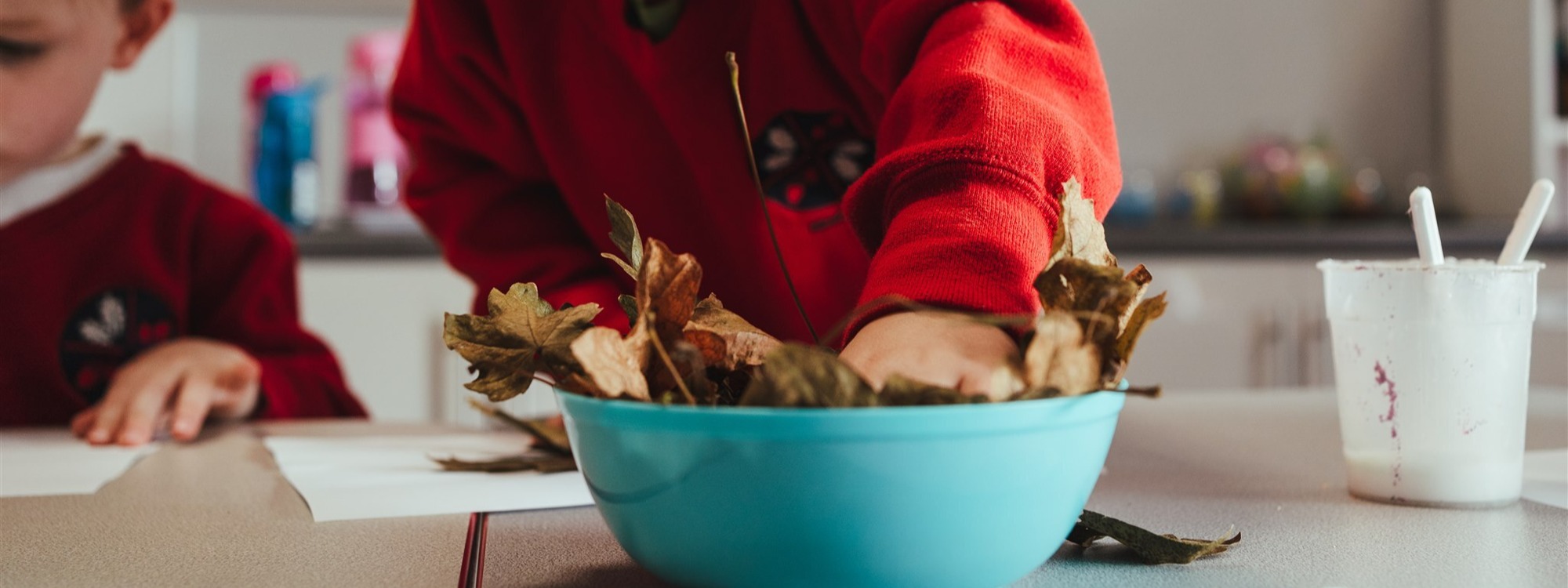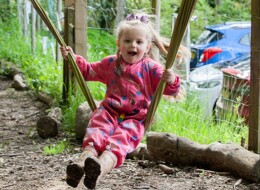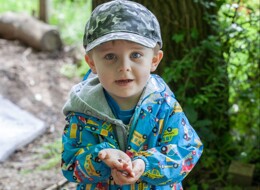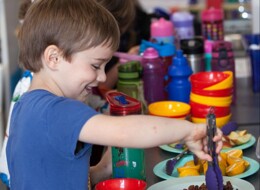Nursery
Welcome to Seal Primary School Nursery
Located near Sevenoaks, Seal Primary School Nursery provides exceptional childcare and early years education for children aged 2 to 4.
As part of the multi-award-winning Seal Primary School, our nursery pupils benefit from access to qualified teachers and enthusiastic nursery assistants who are dedicated to delivering the essential knowledge and skills outlined in the Early Years Foundation Stage (EYFS). We take pride in our provision and the excellent opportunities it offers for learning and development.
We are one of the few nurseries in Kent with a working farm on-site. Your child will enjoy weekly visits to our farm and forest school areas - often a highlight for our young learners - as they discover animals and explore our expansive, tranquil woodland.
We offer both funded and unfunded nursery places in Sevenoaks, available in part-time and full-time formats. Our nursery children engage in regular interactions with our primary school students. This connection significantly eases the transition to primary education for both the child and their parent or carer, ensuring they feel confident and settled in the school environment.
Call us today to book a tour and discover how we can nurture your child's potential in a warm and engaging environment.
Our accreditations include:
- Rights Respecting School Gold Award (2025–2027)
- Wilder Kent Silver Award (2024)
- Finalist in the Community Initiative of the Year category at the 2025 TES Awards
- Green School Award (2025)
Nursery Staff

Mrs Sharpe
Nursery Teacher

Miss Kemp
Nursery Assistant

Mrs Rock
Nursery Assistant

Mrs Wright
Nursery Assistant

Miss Gadd
Acting Nursery Manager & After School Club

Mrs Hacker
Nursery Assistant
What are we learning this term? Term 1
Main experience
Caterpillar's Rules - during this term we help the children settle in the nursery in a nurturing and caring way. We are learning about our class rules and why it is important to follow them to stay safe. We also discuss how the grown-ups keep us safe.
It's Great to be Me - During this experience we explore all the ways we are similar and how we are different. We celelbrate how these differences make us all so special and unique. At the end of the experience we create our own self-portrait.
Autumn Leaves are Falling Down - This experience is an opportunity for children to explore and engage in a range of learning which introduces the children to the Autumn season. We discuss nocturnal animals and our outcome will be to create a hedgehog house for hibernating hedgehogs on the farm.
Discreet experiences
Phonics - we are working on Phonics Phase 1. We are learning sound differentiation - 'What can you hear' games. We are also working on sound qualities - pitch, pace and duration.
How can I support at home?
Encourage listening skills. Ask open-ended questions. Model language and behaviour. Promote independence - putting their shoes on, brushing their teeth, using cutlery.
What are we learning this term? Term 2
Main experience
What do you want to be when you grow up? - in this Understanding the World and Communication and Language experience, we are discovering and exploring different professions. We are also discovering the concept of 'growing' and the different stages in our lives.
Discreet experiences
Phonics - we are continuing on with Phonics phase 1. We are discovering rhyming, alliteration and syllables by counting them.
Maths - we are working with size differentiation - big, small, long, short, tall, short and medium size - and size comparison - bigger, smaller, longer, shorter, taller.
How can I support at home?
Encourage listening skills. Ask open-ended questions. Model language and behaviour. Promote independence - putting their shoes on, brushing their teeth, using cutlery.
Highlight rhyming words. Try to find words that rhyme within stories. Explain that there are some words that begin with the same sounds. Try to find words that begin with the same sounds when talking or telling stories.
Explore size comparison at home. Ask them which one is bigger or smaller. Use size vocabulary.
Pictures
 We learnt that our teachers were also babies and children a little while ago.
We learnt that our teachers were also babies and children a little while ago.  We compared our current pictures with the ones when we were babies.
We compared our current pictures with the ones when we were babies.  We learnt about our favourite professions and role-played.
We learnt about our favourite professions and role-played.  In our outcome, we recorded a video answering the question 'What do we want to be when we grow up?' using effective communication.
In our outcome, we recorded a video answering the question 'What do we want to be when we grow up?' using effective communication.
What are we learning this term? Term 3
Main experience
Here comes the Big Bad Wolf - in this Literacy and Expressive Arts and Design experience, children are learning about stories, their different parts, character and settings. They are also learning how to retell and act out a story.
Discreet experiences
Phonics - we are starting with RWI phonics adapted to nursery. We are introducing the sounds m, a, s, d, t. We are practising our sound recognition at the beginning of words and sound out and blend CVC words that contain those sounds.
Maths - we are learning numbers 1-5 - counting, number recognition and matching quantities. We are working on subitising - fast recognition - of number quantities 1-3.
How can I support at home?
Encourage listening skills. Ask open-ended questions. Model language and behaviour. Promote independence - putting their shoes on, brushing their teeth, using cutlery.
Explain the parts of the book. Ask them what happened in the stories you just told. Act out the different characters in a story. Ask them to make a prediction on how a story might end. Create silly stories together.
Review the sound of the week with them. Play 'I spy' to find items that begin with the same sound.
Encourage counting behaviour around them. Help them to count snacks - grapes, pieces of apple... - steps, jumps... Recognise numbers in the environment.
What are we learning this term? Term 4
Main experience
One apple a day keeps the doctor away - in this Physical Development and Communication and Language experience, children are learning about what 'healthy' means and what healthy habits they can implement within their lives. They are also learning how to communicate these things effectively, using longer sentences.
Discreet experiences
Phonics - we continue with RWI phonics adapted to nursery. We are introducing the sounds i, n, p, g, o. We are practising our sound recognition at the beginning of words and sound out and blend CVC words that contain those sounds and the ones worked during the previous term.
Maths - we continue learning about numbers, subitising 1-3 and counting, learning 'one more and one less', matching and composition of numbers 1-5. We are learning the number line 1-10.
How can I support at home?
Encourage listening skills. Ask open-ended questions. Model language and behaviour. Promote independence - putting their shoes on, brushing their teeth, using cutlery.
Identify healthy habits in their lives. Encourage hygiene and why it is important - washing hands, toothbrushing. Help them select healthy food options. Do some exercise.
Review the sound of the week with them. Play 'I spy' to find items that begin with the same sound. Sound out CVC words for them and blend them.
Encourage counting like behaviour: count how many pieces of fruit they have for snack, how many steps to get to the kitchen... Count numbers 1-5 forwards and backwards, try to guess 'one more and one less'.
What are we learning this term? Term 5
Main experience
Ready, Steady, Grow!
In this experience we learn all about how a plant grows from a tiny seed into a tall plant. We explore the differences between living and non-living things and the outcome for this experience is growing our own beanstalks!
Discreet experiences
Phonics - we continue with RWI phonics adapted to nursery. We are introducing the sounds c, k, u, b, f. We are practising our sound recognition at the beginning of words and sound out and blend CVC words that contain those sounds and the ones worked during the previous term.
Maths - We countinue exploring the numbers 1-5. We are counting, recognising the numerals and being able to match an amount of objects to the corresponding numeral.
How can I support at home?
Encourage listening skills. Ask open-ended questions. Model language and behaviour. Promote independence - putting their shoes on, brushing their teeth, using cutlery.
Take a trip to a local garden centre and explore the different types of plants. Go for walks in the local park or spend time in your garden looking at the living things.
Review the sound of the week with them. Play 'I spy' to find items that begin with the same sound. Sound out CVC words for them and blend them.
Encourage counting like behaviour: count how many pieces of fruit they have for snack, how many steps to get to the kitchen... Count numbers 1-5 forwards and backwards, try to guess 'one more and one less'.
What are we learning this term? Term 6
Main experience
Art Attack!
In this experience we learn all about how to become an artist. We explore the primary colours and what happens when you mix them together. We experiment with different materials and tools to create textures. The oiutcome for this topic will be a unique acrylic painted canvas.
Phonics - we continue with RWI phonics adapted to nursery. We are introducing the sounds e, l h, r, j. We are practising our sound recognition at the beginning of words and sound out and blend CVC words that contain those sounds and the ones worked during the previous term.
Maths
Patterns - We learn all about patterns this term. We explore repeating patterns. At first we recognise the pattern, then we continue patterns and then finally start to make our own.
Shapes - We also lstart to explore shapes this term. We learn the names of simple 2D shapes and use mathematical language to describe them.
How can I support at home?
Encourage listening skills. Ask open-ended questions. Model language and behaviour. Promote independence - putting their shoes on, brushing their teeth, using cutlery.
Have fun exploring colour at home. Can you go on a colour hunt around the house?
Try making a simple repeating pattern with things you might find in your garden pr the local park like leaves and sticks.
Have a look around the house and see if you can spot any simple shapes.
Review the sound of the week with them. Play 'I spy' to find items that begin with the same sound. Sound out CVC words for them and blend them.





